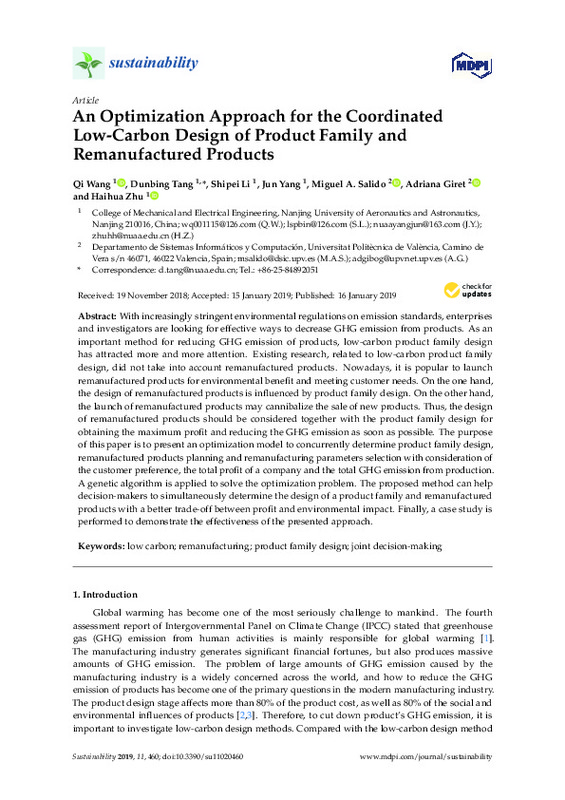Mascle, C., & Zhao, H. P. (2008). Integrating environmental consciousness in product/process development based on life-cycle thinking. International Journal of Production Economics, 112(1), 5-17. doi:10.1016/j.ijpe.2006.08.016
Kengpol, A., & Boonkanit, P. (2011). The decision support framework for developing Ecodesign at conceptual phase based upon ISO/TR 14062. International Journal of Production Economics, 131(1), 4-14. doi:10.1016/j.ijpe.2010.10.006
Ferrer, G., & Swaminathan, J. M. (2010). Managing new and differentiated remanufactured products. European Journal of Operational Research, 203(2), 370-379. doi:10.1016/j.ejor.2009.08.007
[+]
Mascle, C., & Zhao, H. P. (2008). Integrating environmental consciousness in product/process development based on life-cycle thinking. International Journal of Production Economics, 112(1), 5-17. doi:10.1016/j.ijpe.2006.08.016
Kengpol, A., & Boonkanit, P. (2011). The decision support framework for developing Ecodesign at conceptual phase based upon ISO/TR 14062. International Journal of Production Economics, 131(1), 4-14. doi:10.1016/j.ijpe.2010.10.006
Ferrer, G., & Swaminathan, J. M. (2010). Managing new and differentiated remanufactured products. European Journal of Operational Research, 203(2), 370-379. doi:10.1016/j.ejor.2009.08.007
Sutherland, J. W., Adler, D. P., Haapala, K. R., & Kumar, V. (2008). A comparison of manufacturing and remanufacturing energy intensities with application to diesel engine production. CIRP Annals, 57(1), 5-8. doi:10.1016/j.cirp.2008.03.004
Song, J.-S., & Lee, K.-M. (2010). Development of a low-carbon product design system based on embedded GHG emissions. Resources, Conservation and Recycling, 54(9), 547-556. doi:10.1016/j.resconrec.2009.10.012
Qi, Y., & Wu, X. (2011). Low-carbon Technologies Integrated Innovation Strategy Based on Modular Design. Energy Procedia, 5, 2509-2515. doi:10.1016/j.egypro.2011.03.431
Su, J. C. P., Chu, C.-H., & Wang, Y.-T. (2012). A decision support system to estimate the carbon emission and cost of product designs. International Journal of Precision Engineering and Manufacturing, 13(7), 1037-1045. doi:10.1007/s12541-012-0135-y
Kuo, T. C., Chen, H. M., Liu, C. Y., Tu, J.-C., & Yeh, T.-C. (2014). Applying multi-objective planning in low-carbon product design. International Journal of Precision Engineering and Manufacturing, 15(2), 241-249. doi:10.1007/s12541-014-0331-z
Xu, Z.-Z., Wang, Y.-S., Teng, Z.-R., Zhong, C.-Q., & Teng, H.-F. (2015). Low-carbon product multi-objective optimization design for meeting requirements of enterprise, user and government. Journal of Cleaner Production, 103, 747-758. doi:10.1016/j.jclepro.2014.07.067
He, B., Wang, J., Huang, S., & Wang, Y. (2015). Low-carbon product design for product life cycle. Journal of Engineering Design, 26(10-12), 321-339. doi:10.1080/09544828.2015.1053437
Chiang, T.-A., & Che, Z. H. (2015). A decision-making methodology for low-carbon electronic product design. Decision Support Systems, 71, 1-13. doi:10.1016/j.dss.2015.01.004
He, B., Tang, W., Wang, J., Huang, S., Deng, Z., & Wang, Y. (2015). Low-carbon conceptual design based on product life cycle assessment. The International Journal of Advanced Manufacturing Technology, 81(5-8), 863-874. doi:10.1007/s00170-015-7253-5
(Roger) Jiao, J., Simpson, T. W., & Siddique, Z. (2007). Product family design and platform-based product development: a state-of-the-art review. Journal of Intelligent Manufacturing, 18(1), 5-29. doi:10.1007/s10845-007-0003-2
Francalanza, E., Borg, J. C., & Constantinescu, C. L. (2012). A Case for Assisting ‘Product Family’ Manufacturing System Designers. Procedia CIRP, 3, 376-381. doi:10.1016/j.procir.2012.07.065
Bryan, A., Wang, H., & Abell, J. (2013). Concurrent Design of Product Families and Reconfigurable Assembly Systems. Journal of Mechanical Design, 135(5). doi:10.1115/1.4023920
Wang, Q., Tang, D., Yin, L., Salido, M. A., Giret, A., & Xu, Y. (2016). Bi-objective optimization for low-carbon product family design. Robotics and Computer-Integrated Manufacturing, 41, 53-65. doi:10.1016/j.rcim.2016.02.001
Tang, D., Wang, Q., & Ullah, I. (2016). Optimisation of product configuration in consideration of customer satisfaction and low carbon. International Journal of Production Research, 55(12), 3349-3373. doi:10.1080/00207543.2016.1231430
Kim, S., & Moon, S. K. (2017). Sustainable platform identification for product family design. Journal of Cleaner Production, 143, 567-581. doi:10.1016/j.jclepro.2016.12.073
Xiao, W., Du, G., Zhang, Y., & Liu, X. (2018). Coordinated optimization of low-carbon product family and its manufacturing process design by a bilevel game-theoretic model. Journal of Cleaner Production, 184, 754-773. doi:10.1016/j.jclepro.2018.02.240
Mangun, D., & Thurston, D. L. (2002). Incorporating component reuse, remanufacture, and recycle into product portfolio design. IEEE Transactions on Engineering Management, 49(4), 479-490. doi:10.1109/tem.2002.807292
Debo, L. G., Toktay, L. B., & Wassenhove, L. N. V. (2009). Joint Life-Cycle Dynamics of New and Remanufactured Products. Production and Operations Management, 15(4), 498-513. doi:10.1111/j.1937-5956.2006.tb00159.x
Vorasayan, J., & Ryan, S. M. (2009). Optimal Price and Quantity of Refurbished Products. Production and Operations Management, 15(3), 369-383. doi:10.1111/j.1937-5956.2006.tb00251.x
Kwak, M., & Kim, H. M. (2011). Assessing product family design from an end-of-life perspective. Engineering Optimization, 43(3), 233-255. doi:10.1080/0305215x.2010.482990
Kwak, M., & Kim, H. (2012). Market Positioning of Remanufactured Products With Optimal Planning for Part Upgrades. Journal of Mechanical Design, 135(1), 011007. doi:10.1115/1.4023000
Debo, L. G., Toktay, L. B., & Van Wassenhove, L. N. (2005). Market Segmentation and Product Technology Selection for Remanufacturable Products. Management Science, 51(8), 1193-1205. doi:10.1287/mnsc.1050.0369
Ferguson, M. E., & Toktay, L. B. (2009). The Effect of Competition on Recovery Strategies. Production and Operations Management, 15(3), 351-368. doi:10.1111/j.1937-5956.2006.tb00250.x
Jin, Y., Muriel, A., & Lu, Y. (2015). When to Offer Lower Quality or Remanufactured Versions of a Product. Decision Sciences, 47(4), 699-719. doi:10.1111/deci.12175
Liu, B., Holmbom, M., Segerstedt, A., & Chen, W. (2014). Effects of carbon emission regulations on remanufacturing decisions with limited information of demand distribution. International Journal of Production Research, 53(2), 532-548. doi:10.1080/00207543.2014.957875
Wang, Y., Chen, W., & Liu, B. (2017). Manufacturing/remanufacturing decisions for a capital-constrained manufacturer considering carbon emission cap and trade. Journal of Cleaner Production, 140, 1118-1128. doi:10.1016/j.jclepro.2016.10.058
Yenipazarli, A. (2016). Managing new and remanufactured products to mitigate environmental damage under emissions regulation. European Journal of Operational Research, 249(1), 117-130. doi:10.1016/j.ejor.2015.08.020
Perera, H. S. ., Nagarur, N., & Tabucanon, M. T. (1999). Component part standardization: A way to reduce the life-cycle costs of products. International Journal of Production Economics, 60-61, 109-116. doi:10.1016/s0925-5273(98)00179-0
Jiao, J., & Zhang, Y. (2005). Product portfolio planning with customer-engineering interaction. IIE Transactions, 37(9), 801-814. doi:10.1080/07408170590917011
Mukhopadhyay, S. K., & Ma, H. (2009). Joint procurement and production decisions in remanufacturing under quality and demand uncertainty. International Journal of Production Economics, 120(1), 5-17. doi:10.1016/j.ijpe.2008.07.032
Wang, K., & Choi, S. H. (2014). A holonic approach to flexible flow shop scheduling under stochastic processing times. Computers & Operations Research, 43, 157-168. doi:10.1016/j.cor.2013.09.013
[-]









